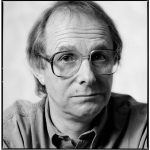A two-week, 21-film festival of work by British director KEN LOACH, spanning his six-decade career, will run at Film Forum from Friday, April 19 through Thursday, May 2.
The series is preceded by a run of Loach’s latest film – and what he has announced to be his final – THE OLD OAK, opening on Friday, April 5.
Loach’s career began in the mid-1960s when fellow socialist Tony Garnett recruited him to direct episodes for the BBC’s ‘Wednesday Play’ series. Loach’s 10 contributions examined social issues faced by ordinary Britons at the bottom of the social ladder and tackled controversial subjects such as abortion, homelessness, and labor strikes.
Through use of nonprofessional actors, improvised dialogue, and location shooting, Loach developed his realist style, “a subtle cinematic language, merging elements of documentary and fiction.” (James Monaco).
POOR COW (1967), Loach’s feature debut, stars Terence Stamp and Carol White as two ill-fated and deeply troubled South Londoners navigating the dark side of the swinging sixties. It proved to be a surprise commercial hit and helped kick-start a new movement in social realist filmmaking. Loach would establish an international reputation with KES (1969), the first of his many collaborations with Chris Menges as cinematographer and produced by Garnett and Loach’s own company, Kestrel Films. Although a critical and modest commercial success in Britain, KES wasn’t released in the U.S. at the time, due to the impenetrability of the characters’ Yorkshire accents.
The 1970s and early ‘80s were a period of less commercial success for Loach, as he turned to making television documentaries, works critical of the military or focused on key figures of union organizing efforts. Loach reflected on his career in 1984, “I suppose all my films are political because they argue for social change, and–commercially speaking– that’s very tricky. I’d like to make more films for the cinema. But I’m not going to change the subject matter, or the objective, or the way I work in order to get the money.”
Loach returned to cinemas with such overtly political films and working class dramas as HIDDEN AGENDA (1990), his first collaboration with longtime producer Rebecca O’Brien, a thriller set in Northern Ireland starring Frances McDormand and Brian Cox; RIFF-RAFF (1991), a hit comedy about Glaswegian construction workers building luxury condos in London; the Cannes Jury-prize winning RAINING STONES (1993) about a man struggling to earn money to buy his daughter a communion dress; LADYBIRD, LADYBIRD (1994) a raw, wrenching drama starring Crissy Rock as a single mother struggling to hold her family together, which had its U.S. premiere at Film Forum in 1994; and CARLA’S SONG (1996), on the counter-revolution in Nicaragua. The latter was Loach’s first collaboration with screenwriter Paul Laverty, a close creative partner who has written almost all of Loach’s subsequent films.
With BREAD AND ROSES (2000), starring Adrien Brody and Pilar Padilla, Loach traveled to Hollywood for the first (and last) time to tell the story of custodial workers in Los Angeles and their fight for better working conditions and the right to unionize. He won his first of two Cannes Palme d’Or prizes for THE WIND THAT SHAKES THE BARLEY (2006), a historical drama set at the time of the Irish war of independence, starring Cillian Murphy (winner of this year’s Best Actor Oscar® for Oppenheimer). Loach’s most commercial film, the unexpected sports comedy LOOKING FOR ERIC (2009), stars ex-Manchester United footballer Eric Cantona as an imaginary life coach to Steve Evets’ down-and-out postal worker.
Loach won his second Palme d’Or and BAFTA’s “Outstanding British Film” award for I, DANIEL BLAKE (2016), a drama about a man who survives a heart attack only to deal with medical bureaucracies. For his recent drama SORRY WE MISSED YOU, a Film Forum premiere in 2019, Loach trained his lens on the human cost of the gig economy.
Throughout his six-decade career, Ken Loach has always set his sights on telling real stories about real people, and considers filmmaking to be a collective effort. “Loach has built a body of work unsurpassed for its relentless analysis of social and political injustice. Not that Loach has much use for the auteur theory, modestly considering himself a collaborator rather than a shaping visionary.” (Graham Fuller, editor, Loach on Loach)
KEN LOACH has been programmed by Stephanie Gross, Film Forum Repertory Programming Associate.

